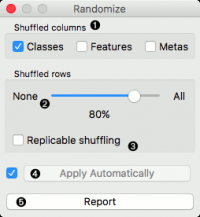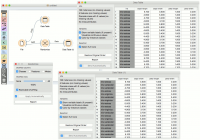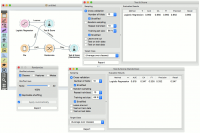Difference between revisions of "Orange: Randomize"
Jump to navigation
Jump to search
Onnowpurbo (talk | contribs) |
Onnowpurbo (talk | contribs) |
||
| Line 14: | Line 14: | ||
The Randomize widget receives a dataset in the input and outputs the same dataset in which the classes, attributes or/and metas are shuffled. | The Randomize widget receives a dataset in the input and outputs the same dataset in which the classes, attributes or/and metas are shuffled. | ||
| − | + | [[File:Randomize-Default.png|center|200px|thumb]] | |
| + | |||
Select group of columns of the dataset you want to shuffle. | Select group of columns of the dataset you want to shuffle. | ||
| Line 26: | Line 27: | ||
Produce a report. | Produce a report. | ||
| − | + | ==Contoh== | |
The Randomize widget is usually placed right after (e.g. File widget. The basic usage is shown in the following workflow, where values of class variable of Iris dataset are randomly shuffled. | The Randomize widget is usually placed right after (e.g. File widget. The basic usage is shown in the following workflow, where values of class variable of Iris dataset are randomly shuffled. | ||
| − | + | [[File:Randomize-Example1.png|center|200px|thumb]] | |
In the next example we show how shuffling class values influences model performance on the same dataset as above. | In the next example we show how shuffling class values influences model performance on the same dataset as above. | ||
| − | + | [[File:Randomize-Example2.png|center|200px|thumb]] | |
Revision as of 11:29, 21 January 2020
Sumber: https://docs.biolab.si//3/visual-programming/widgets/data/randomize.html
Shuffles classes, attributes and/or metas of an input dataset.
Inputs
Data: input dataset
Outputs
Data: randomized dataset
The Randomize widget receives a dataset in the input and outputs the same dataset in which the classes, attributes or/and metas are shuffled.
Select group of columns of the dataset you want to shuffle.
Select proportion of the dataset you want to shuffle.
Produce replicable output.
If Apply automatically is ticked, changes are committed automatically. Otherwise, you have to press Apply after each change.
Produce a report.
Contoh
The Randomize widget is usually placed right after (e.g. File widget. The basic usage is shown in the following workflow, where values of class variable of Iris dataset are randomly shuffled.
In the next example we show how shuffling class values influences model performance on the same dataset as above.


